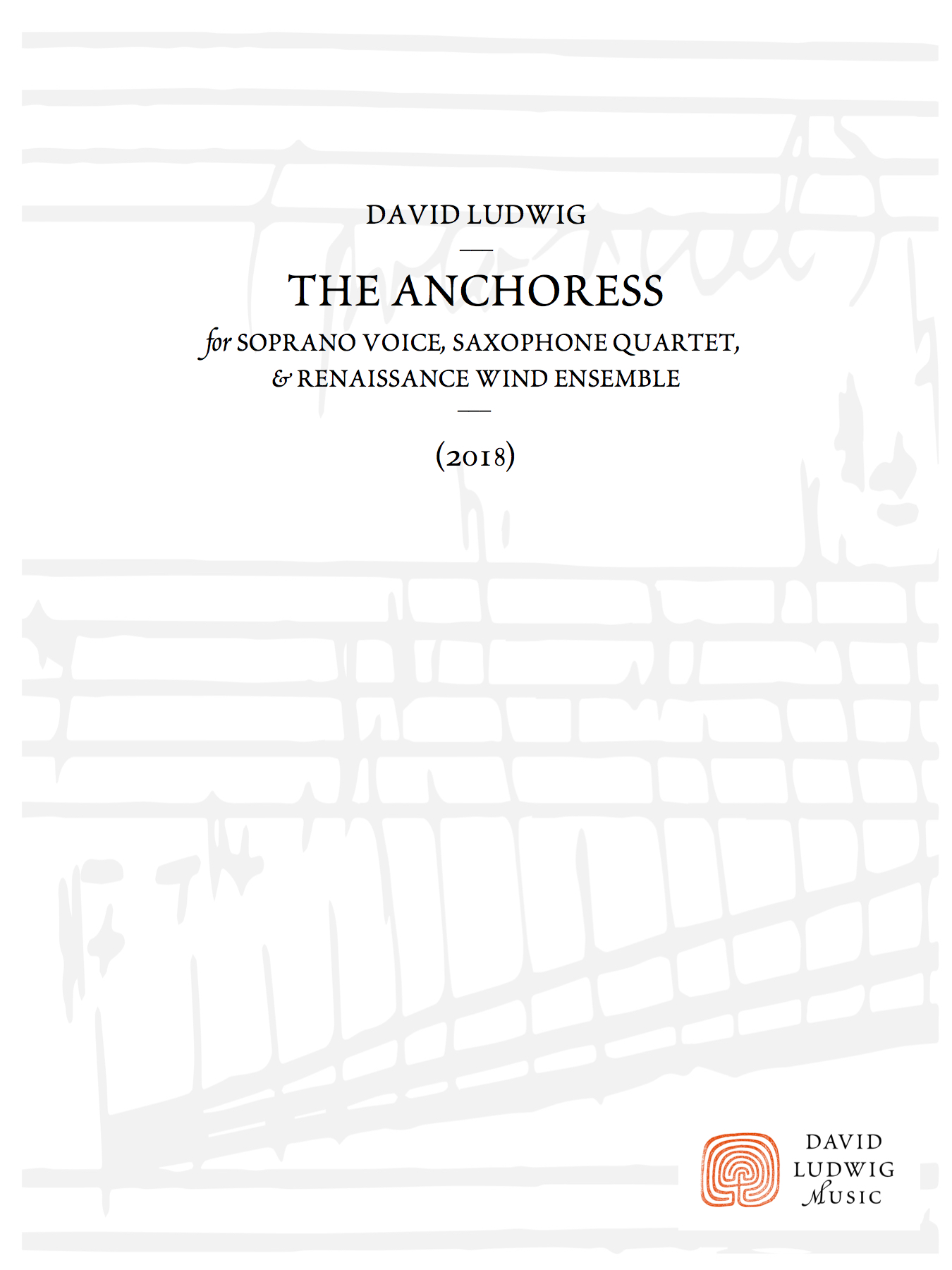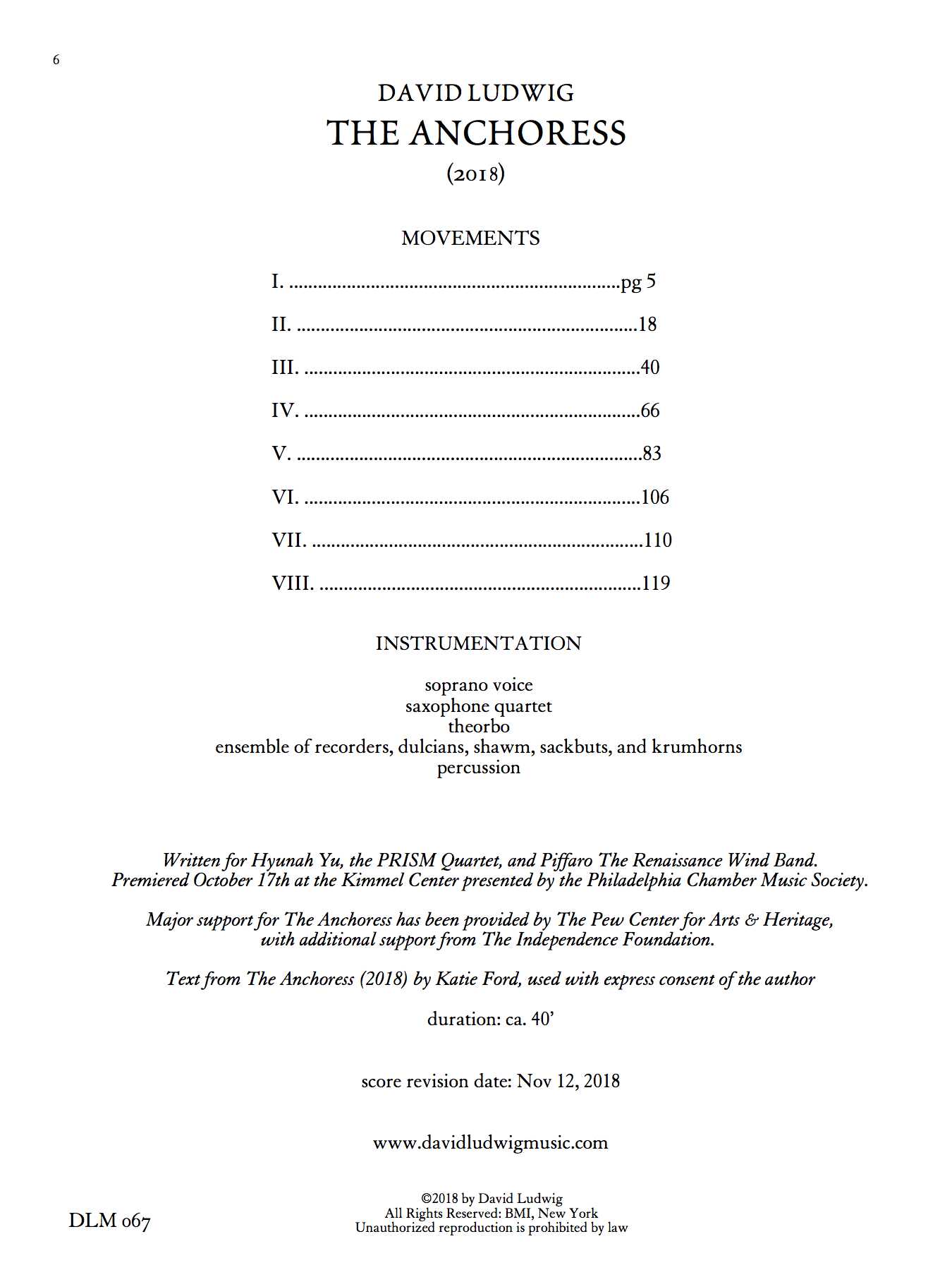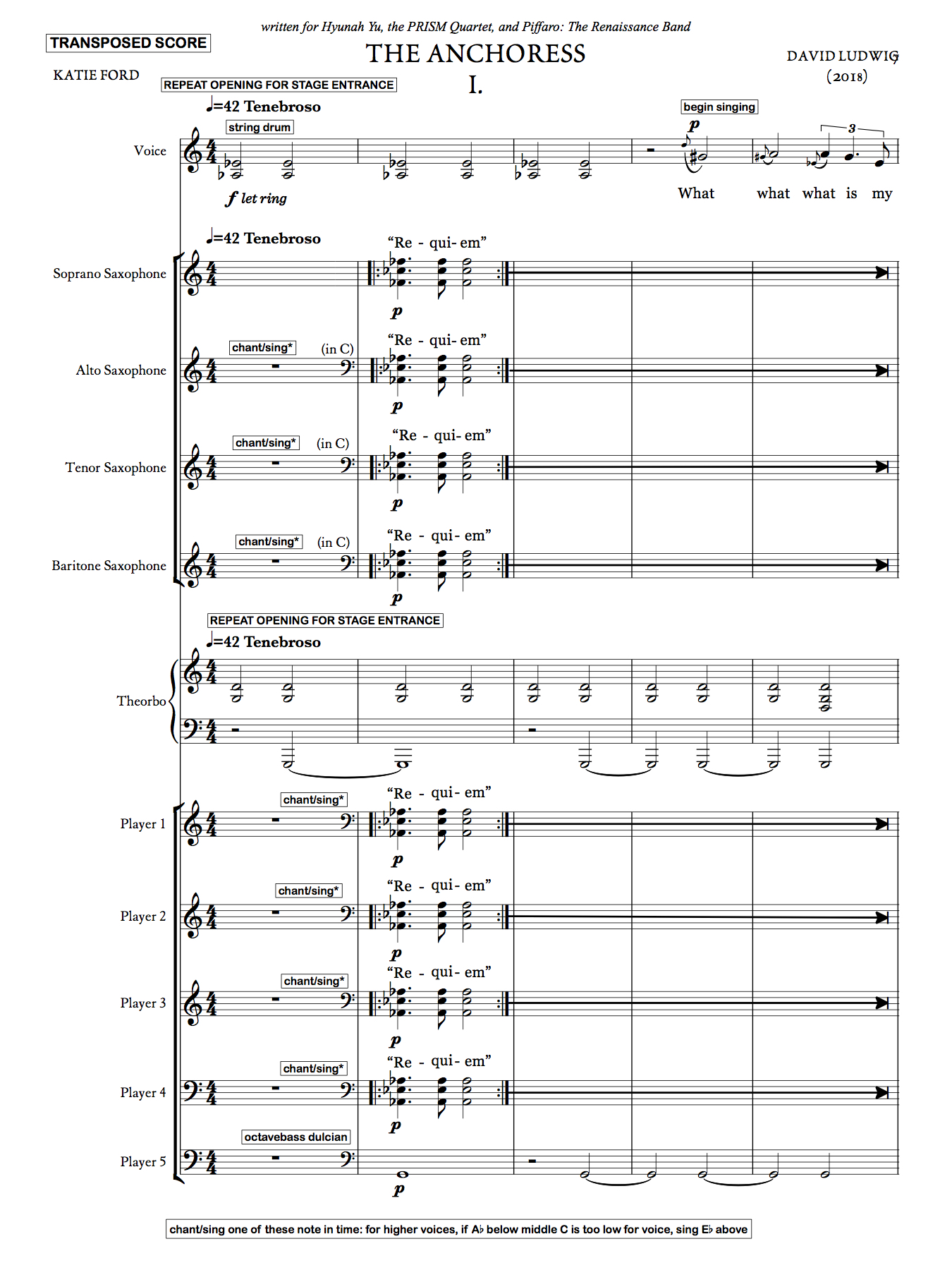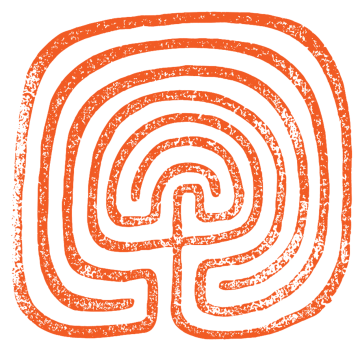The Anchoress
The Anchoress (2018) contemporary monodrama for ancient and modern instruments - 40’
- soprano, saxophone quartet, theorbo, ensemble of recorders, dulcians, shawm, sackbuts, and krumhorns, percussion
- text by Katie Ford
- World Premiere by Hyunah Yu, soprano, PRISM Quartet, and Piffaro, The Renaissance band, presented by Philadelphia Chamber Music Society
Support for The Anchoress was provided to David Serkin Ludwig by The Pew Center for Arts & Heritage.
rental information
Program Notes
The Anchoress explores struggles with faith, alienation, gender, and social power through the imagined person of a Medieval anchorite. Anchorism as a movement lasted throughout early Christianity to about the time of Shakespeare; and though it was a gender-neutral practice, at its height women anchorites outnumbered men four to one. An anchoress would permanently sequester herself into a small cell an ‘anchorhold,’ attached to a church. She had one small window through which to speak to townspeople coming to her for guidance. Her daily life resembled a prayerful funereal rite. By withdrawing from the world and choosing a form of death, she became a “living saint” in the eyes of the Church.
more information



Movements and Recording Time-codes
I. What Is My Life? (0:33)
II. Once a Woman Went Down the Hill (5:15)
III. What Are We to Make of Visions Lit? (8:42)
IV. This Is the Four Burns of the Soul (12:58)
V. One Night in Particular (15:49)
VI. A Woman of the Village (20:35)
VII. Be Not Assured (22:39)
VIII. When I Woke Up Sighing (25:09)
Press
“In the Middle Ages, one way for a woman to achieve the stamp of Christian holiness was to sequester herself in a small, sealed-up cell (known as an ‘anchor-hold’) abutting a church. Sanctified by reclusion and privation, she could then dispense guidance to laypeople from her window. It’s a natural subject for a monodrama, a trick form that requires the composer, and the soloist, to hold the audience rapt with what is essentially an extended soliloquy. David Ludwig and Katie Ford’s one-woman opera (written for the period winds of the ensemble Piffaro, the modern saxophones of the PRISM Quartet, and soprano Hyunah Yu) conjures a time of medieval mysticism, but the social dynamic it highlights—one that honors women only by relegating them—is not bound by any era.” — The New Yorker
“David Serkin Ludwig has an ear for beauty. This may seem like a given for a composer, but somehow, for some, the quality can be elusive. Which is not to say Ludwig doesn’t also use tension and dissonance. But the musical line in his pieces ultimately leads to a kind of going home — harmonically and emotionally ... Ludwig mixed wisely the modern saxes with ancient instruments like lute and delicate winds, opening up sound possibilities that were unusual, if not unique, like a gorgeous rush at the harmonic series from the ensemble in one song, a wheezing effect made beautiful in another. Yu had great stage presence, and her ability to double instruments with dead-on intonation and color match had a powerful effect all its own ... Composer and poet (Katie Ford) were as one, too. The last song unfurls quickly (sighing, waking up frozen, and accepting God despite and even through nothingness) in a text whose meaning Ludwig deepens with great skill. The music floats — sadly, beautifully, and with a small but keenly felt building toward hope as the musicians file off stage.” — The Philadelphia Inquirer
“Anchorites (from the ancient Greek ‘to withdraw’) embraced a fiercely solipsistic isolation – a virtually black-box retreat into a mystic binary system of self-alone-with-God ... In The Anchoress, the inner life of one such woman is explored and given potent, fascinating voice ... Ludwig’s is a compositional voice of self-evident sincerity and authenticity ... [His] setting of The Anchoress boasts myriad felicities. Perhaps primary among these is his choice of orchestration. There is almost certainly no direct precedent for Ludwig’s combining of a suite of historical, Renaissance-era instruments (here played by the accomplished Piffaro band) with a quartet of modern saxophones (the members of PRISM), but it proves to be a canny and spot-on correlative to Ford’s synoptic reading of fictitious antique text and contemporary sensibility ... The role of the anchoress was sung by soprano Hyunah Yu with consummate poise, authority and charisma.” — La Scene Musicale
“‘The Anchoress’ seizes upon an overlooked aspect of medieval culture, and in exploring its possibilities, relates a deliberately-overwhelming abundance of sensation, experience, and inner revelation. Ludwig’s music and arrangement deftly evokes the surrounding world of the middle ages in which the anchoress finds herself; though there are many efforts made to create the medieval traditional sound and feeling, Ludwig’s composition is unafraid to employ novel effects and modern instruments to support, and even censor, its beauty. Hyunah Yu’s treatment of the libretto did much to bring out the abstract, almost nebulous beauty of Ford’s libretto. All of this made for a spiritual and sonorous trip back in time. While ‘The Anchoress’ begins as a tale of enclosure, it proves that what we find by looking inward is truly something to behold.” — Operawire
(Ludwig describes his compositional process): “‘These are kind of the bookends of music history,’ Ludwig said. ‘[It's challenging] writing for a saxophone quartet, which in many ways is the most modern acoustic set of instruments, and ancient Renaissance winds, whose histories go back hundreds of years. They have very different tones and colors, but that was something I wanted to make a feature and not a bug.’” — WHYY
“Katie Ford’s poetry probes the ‘spiritual cost of survival’ (New York Times Book Review)—an equally apt description of her latest collaboration with composer David Ludwig. Their new monodrama, The Anchoress, depicts a medieval mystic, who spends her life permanently walled inside a small cell. The piece fuses ancient and modern elements through its narrative and through its orchestration for soprano Hyunah Yu, Piffaro: The Renaissance Band, and PRISM saxophone quartet.” — I CARE IF YOU LISTEN

